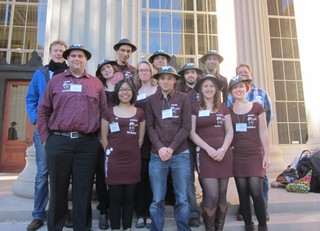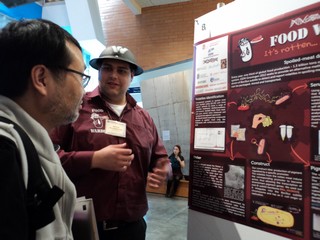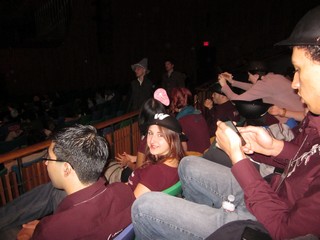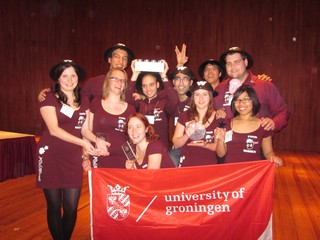‘Is this real?!’ RUG team world champion

First there was well over three quarters of an hour of rising tension – after a seemingly endless stream of awards like ‘Best Software’ or ‘Best Manufacturing’, the final announcement was finally made last Monday night at around 8.30 p.m.: ‘And the Grand Prize Winner of iGEM 2012 is… Team Groningen!’
With their design of a bacterium which signals when meat is off, the RUG team Food Wardenbecame the overall winners of the iGEM World Jamboree in synthetic biology. A few weeks earlier, the team had already won the European preliminary round. The aim of the iGEM competition is to build a designer bacterium that can perform a useful task, using standard genetic parts called ‘BioBricks’.
A few hours after the award ceremony, Renske van Raaphorst, member of the University of Groningen team, hasn’t quite recovered yet from the awards ceremony in Boston, US. ‘Is this real? We are all flabbergasted, we didn’t expect we to do this well’, she says. ‘Our practice presentation didn’t go at all well, but during the finals things began to come together. And then the prizes started coming in. It’s bizarre!’

The Food Warden team, which is made up of eleven University of Groningen students, first bagged the prize for ‘best poster’, then ‘best presentation’, ‘best project in Food and Energy’ and the ‘iGEMmers prize’, awarded by their fellow competitors. And finally the Grand Prize.
It’s the fifth time that a team from Groningen has participated in the iGEM competition, says professor of molecular genetics Oscar Kuipers. He took the initiative to form the first University of Groningen team. ‘At the time, the University had just started a Centre for Synthetic Biology. For the first two years, the students got no reward whatsoever for their work in the iGEM team. Now they get 20 ECTS credit points – still far too little for the time they have to invest in the project, as it runs from April until early November, but better than nothing.’
The iGEM challenge requires teams to design and construct a bacterium using standard genetic components, the BioBricks. If a team can’t find the component they need they can design their own BioBrick, which is then added to the iGEM catalogue. In the end, the bacterium should be able to perform some task. Teams from Groningen have previously designed bacteria that can count, or detect arsenic pollution.

This year, team Food Warden designed a bacterium that can detect when meat begins to go off, and it responds by producing a coloured dye. The bacteria are sealed inside a special plastic foil bag, which you can put in a container with that left-over bit of raw mince.
‘The great thing is that this team did all the work themselves’, says Kuipers, who supervised Food Warden. ‘That is a really valuable learning experience.’ The team comprised different specialists, ranging from information technology to materials science. And of course a lot of students from Life Sciences to work on the genetic building blocks. The foil bags were the brainchild of a student of biomedical engineering. Learning how to work in a multidisciplinary team is one of the most valuable experiences from being in an iGEM team.
‘We have designed an iGEM-like Master’s course unit, which we will be teaching in the near future. It caters for students interested in synthetic biology’, says Kuipers. Engineering living organisms is becoming more and more popular and important. Just think of bacteria that can produce biofuels, or raw materials for industry.
The iGEM team is expected to return to Groningen in about a week’s time. ‘Usually, these teams fall apart pretty quickly after the iGEM finals, as students have to continue their different degree programmes.’ But this year they may get some invitations to present their results. ‘And the team was approached by an editor of the journal ACS Synthetic Biology, who was interested in an article on their project. We will be writing that in the coming period.’

Next year there’s iGEM 2013, and a new team will be formed. Kuipers: ‘Each year we have ten to twelve applicants, which is just about right for a team. If more students apply, we’ll have to select about a dozen.’ Students have to be really motivated to take part, as the team is expected to work through most of the summer period.
Kuipers points out that teams from the University of Groningen have done consistently well over the past five years. Every year there has been a Gold Medal, which you get if you meet a series of pre-set criteria. Once, a University of Groningen team made it into the top 6 at iGEM. After winning this year, the pressure will really be on the next team. ‘But as I’ve said, we’ve always done well. And that applies to the Netherlands as a whole. This year, only 18 European teams were allowed to take part in the finals. Three Dutch teams made it through the European selection round.’ Apart from Groningen, these were teams from the technical universities of Delft and Eindhoven.
But for Food Warden, this is the end of the line. They’ll take a few days off in the US, and then they will head home. ‘We’re going to throw a party for them here’, says Kuipers. Sibrand Poppema, chairman of the University Board, has also sent the team his congratulations.
In Boston the team is still recovering, says Renske. ‘We are still a bit shell-shocked.’
See also the University of Groningen press release.
| Last modified: | 17 March 2020 3.50 p.m. |
More news
-
21 November 2024
Dutch Research Agenda funding for research to improve climate policy
Michele Cucuzzella and Ming Cao are partners in the research programme ‘Behavioural Insights for Climate Policy’
-
13 November 2024
Can we live on our planet without destroying it?
How much land, water, and other resources does our lifestyle require? And how can we adapt this lifestyle to stay within the limits of what the Earth can give?
-
13 November 2024
Emergentie-onderzoek in de kosmologie ontvangt NWA-ORC-subsidie
Emergentie in de kosmologie - Het doel van het onderzoek is oa te begrijpen hoe ruimte, tijd, zwaartekracht en het universum uit bijna niets lijken te ontstaan. Meer informatie hierover in het nieuwsbericht.

